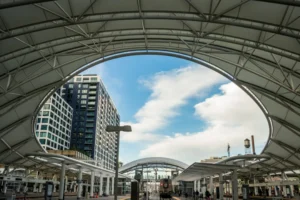By: Nathan Abbott, Site Development Project Manager
 Denver is a rapidly growing city, with traffic increasing as steadily as its population. In an effort to shift residents to more sustainable and effective means of transportation as the city grows, the City of Denver approved a bill for filing which amends Chapter 54 of the Denver Revised Municipal Code to enable and administer a Transportation Demand Management (TDM) program. This bill affects transportation design and strategies for new developments, and is expected to be implemented in the summer of 2021.
Denver is a rapidly growing city, with traffic increasing as steadily as its population. In an effort to shift residents to more sustainable and effective means of transportation as the city grows, the City of Denver approved a bill for filing which amends Chapter 54 of the Denver Revised Municipal Code to enable and administer a Transportation Demand Management (TDM) program. This bill affects transportation design and strategies for new developments, and is expected to be implemented in the summer of 2021.
Cities around the country are faced with growing population, a rapid pace of new development and, in turn, more traffic. Many cities and localities are taking measures to address these concerns. Denver is one such city that is supporting residents and commuters in a move away from single-occupancy vehicles (SOV) to more sustainable and efficient forms of transportation.
TDM is a collection of strategies that shift the how, when, and where of people’s travel to increase system efficiency, reduce SOV trips, improve regional air quality, and achieve citywide mobility goals.
Strategies include, but are not limited to, providing secured bicycle parking, providing showers and lockers for bike commuters, providing subsidized or free transit passes, offering credits for options like shared bikes or scooters, and more. Often times TDM can provide real tangible benefits to a project, including higher lease rates for the end user, more marketability in congested areas, and reduction of parking needs.

Any new project in the City of Denver:
And combinations of the above. Contact our Development Services team to find out if your project will need to consider this new policy.
The goal of the policy is to reduce the number of SOV trips by a percentage determined by the project’s location and character. A menu of TDM strategies are available to choose from that further the SOV reduction. Galloway’s land planning, architecture, and transportation engineers can help determine which TDM elements will fit seamlessly into your project and provide the greatest benefit once implemented.
The City will also require monitoring and reporting on the progress of the TDM strategies and SOV rate to ensure the reduction goals are being met. Like other policies within the City, site plan review can be denied, certificate of occupancy can be withheld, and citations can be issued for failure to comply with this policy. It may seem like more hoops to jump through, but we are here to provide assistance with navigating the policy and ensuring that these TDM elements provide real value to your projects.
The policy will be finalized June 1, 2021. The current policy document is available here: Transportation Options: Requirement for New Development. The City has also provided a Transportation Demand Management page for updated resources including a link to a webinar of the new requirements found on the Department of Transportation Infrastructure (DOTI)’s YouTube channel.
Our teams are staying updated on the policy’s progress as information becomes available, so check back here or give us a call.
Updated May 27, 2021
Contact our team to learn more about the effects of this policy on your land development project.
Contact Us